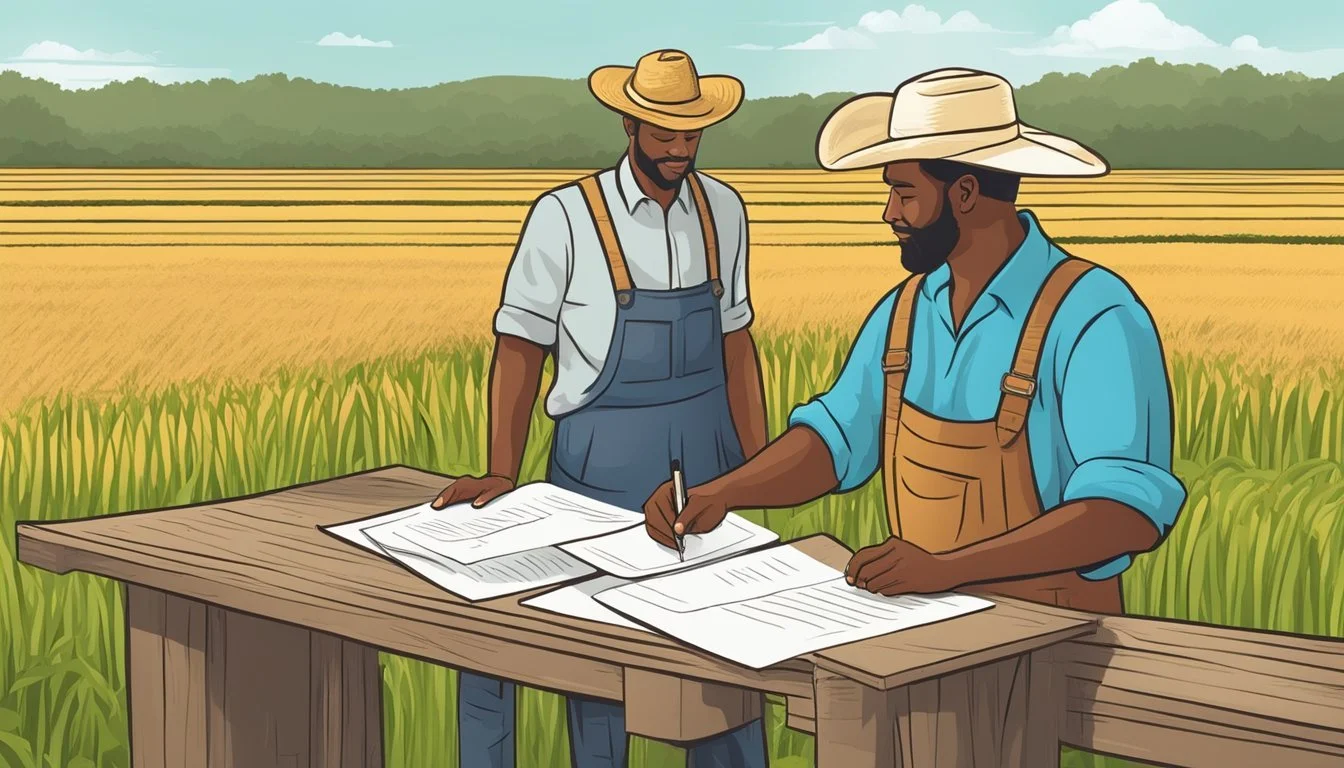South Carolina Farm Land for Lease
Opportunities and Options
This Article is Part of Our Guide on Navigating Agricultural Leases Across the US
South Carolina boasts a rich agricultural heritage, with a landscape that is as varied as it is fertile, ranging from rolling hills to flat plains suitable for a multitude of farming operations. The state’s agricultural industry offers prospective farmers and landowners diverse opportunities, particularly through farm land leasing. Leasing land in South Carolina is a viable option for beginning and expanding agriculture businesses, as it provides a more financially accessible pathway compared to purchasing property outright.
Lease agreements in South Carolina vary, catering to different agricultural needs—from small-scale farming ventures to extensive crop production. This flexibility allows for a wide array of agricultural pursuits such as livestock, row crops, and specialty farming. The state promotes the continued use of its land for agriculture through programs like SC Farm Link, which connects farmers seeking land with landowners. Farmland rental rates in South Carolina have seen an increase over the past two decades, indicating a steady interest and investment in the sector.
Land for lease is available throughout the state, encompassing a range of acreages and resources to suit various farming operations. Those interested in leasing farm land can find properties of different sizes and with varying amenities, from essential infrastructure to prime locations near markets. It's crucial for potential lessees to carefully consider the terms and conditions of their lease agreements, ensuring they align with their farming objectives and financial plans.
Understanding Land Lease Agreements in South Carolina
In South Carolina, land lease agreements are pivotal for both landowners and those seeking to use farmland for agricultural purposes. These contractual arrangements lay the foundation for a mutually beneficial relationship, ensuring legal clarity and financial stability for both parties.
Types of Farmland Leases
There are primarily three types of farmland leases:
Cash Rent Lease: Tenant pays a set amount of rent, either in lump sum or installments.
Crop Share Lease: Rent is based on a percentage of the crop yield.
Flexible Cash Lease: Rent varies based on commodity prices, yields, or revenue.
Each type of lease serves different needs and risk-sharing preferences of the landlord and tenant.
Legal Considerations for Leasing
When drafting a farm lease agreement in South Carolina, the following points should be covered:
Duration: Specifying the start and end date of the lease.
Payment Terms: Clearly outlining the rent amount and payment schedule.
Use of Property: Defining what farming activities are permitted.
Maintenance: Assigning responsibilities for upkeep and improvements.
Written agreements are strongly advised to prevent disputes.
Benefits of Leasing Farmland
Leasing can provide several advantages:
For Landowners: It generates steady income and ensures that their land remains in agricultural production.
For Tenants: It allows for operational flexibility and access to farmland without the need for large capital investments.
A well-structured lease agreement can create a positive outcome for both parties involved in South Carolina's agricultural landscape.
Finding Farm Land for Lease in South Carolina
In South Carolina, those looking to lease farm land have a range of options from commercial land leases to private listings. Understanding the avenues for locating and leasing agricultural property is essential for prospective tenants.
Sources for Available Land Listings
Prospective lessees can find listings for farm land leases through several dedicated platforms and services. A notable resource is AcreTrader, which provides information on agricultural rental rates, offering insight into the financial aspects of leasing. LandSearch is another platform that lists available South Carolina land for lease, presenting both commercial and private properties. Additionally, the South Carolina Department of Agriculture may offer resources such as SC Farm Link, which aims to connect landowners with farmers seeking land, thus making the search for suitable acreage more focused and efficient.
AcreTrader - Details on rental rates and farmland returns.
LandSearch - Listings that include commercial properties and private acreage.
SC Farm Link - Local government service for matching properties with potential lessees.
Commercial Property Leases Versus Private Listings
When considering land for lease, it's important to differentiate between commercial property leases and private listings. Commercial leases often involve larger tracts of land and may come with longer lease terms and higher listing prices. This option is suitable for established farmers or agricultural businesses needing significant acreage for extensive operations. On the other hand, private listings could be more flexible, offering smaller or diverse parcels that can appeal to a range of agricultural pursuits, from small organic farms to pasture land.
Commercial leases:
Typically involve larger areas of land.
May have longer lease terms.
Generally higher listing prices.
Private listings:
Can offer more diverse and smaller tracts of land.
More flexible lease terms.
May appeal to smaller-scale operations.
Both types of leases can be found on the aforementioned platforms, providing a comprehensive view of what's available in the market for farmland for lease in South Carolina.
Evaluating and Comparing Properties
When considering farm land for lease in South Carolina, prospective lessees should meticulously assess the property's acreage and soil quality as well as its location in relation to markets. Each aspect plays a crucial role in determining the land's suitability for specific agricultural purposes, from tillable farming to cattle pastures.
Assessing Acreage and Soil Quality
The acreage of a farm is a primary factor in evaluating its potential. Lessees should confirm the exact acreage available for lease, ensuring it meets their particular farming needs. It's critical to ascertain whether the land includes tillable farming ground or is suitable for cattle pastures.
Soil Quality is another paramount consideration. They must examine soil health and nutrient levels, as these directly affect crop yield and pasture quality. South Carolina's diverse counties offer varying soil types; therefore, a soil test can provide essential information on its composition and fertility.
Location and Access to Markets
Proximity to Markets: The farm's location in relation to local markets and processing facilities can significantly impact profitability and operational efficiency. Farms closer to markets may incur lower transportation costs and have better access to buyers.
County Infrastructure: Access to roads, water sources, and utilities also affects the property's value. Lessees must consider the farm's accessibility for suppliers and clients, as well as the infrastructure in the specific county where the property is located.
By closely examining these factors, one can identify the most suitable properties that align with their agricultural goals in South Carolina. This detailed approach ensures informed decision-making and ultimately influences the success of the farming enterprise.
Agricultural Trends and Market Rates in South Carolina
In South Carolina, the landscape of agricultural real estate remains a focal point for both farmers and investors, with market prices adjusting to the ebb and flow of demand and supply.
Current Market Prices for Leasing
The leasing of agricultural land in South Carolina varies depending on the type and quality of the land, whether it's grazing land or arable agricultural land. Current market prices reflect a nuanced real estate market that caters to different types of agricultural use. As of late data, average lease rates for arable agricultural land generally show a positive trend.
Average Lease Rates by County
Determining the precise lease rates for South Carolina farmland requires an examination of the values on a county-by-county basis. This is due to the diversity in soil quality, climate, and agricultural viability of each county. The table below provides a snapshot of average lease rates in select counties for the year when the latest data is available:
County Average Lease Rate per Acre County A $xx County B $xx County C $xx
Note: The above rates are illustrative and should not be considered current market rates. For accurate and up-to-date rates, one should consult local resources or a professional in South Carolina's agricultural real estate market.
Lease Agreement Best Practices
When leasing agricultural land in South Carolina, it is crucial to establish clear parameters and expectations for both parties involved. Crafting a balanced lease agreement and familiarizing oneself with standard lease terminology are the cornerstones of a successful leasing relationship.
Drafting an Equitable Lease
The lessee and the landowner both benefit when they create a lease agreement that is fair and specific. It should include, but not be limited to:
Identification of Parties: The full names and contact information of the landowner and the farmer or rancher.
Description of Property: A detailed description of the leased premises, including boundaries and total acreage.
Lease Duration: The start and end dates of the lease term, renewal options, and termination conditions.
Financial Arrangements: Clearly outlined payment schedule, amount, and acceptable payment methods. Also, address whether there are flexible payment options tied to crop yield or market price.
Land Use Provisions: Explicit mention of what the land will be used for, such as crop cultivation or livestock grazing. A clause should be included for making adjustments in case of unforeseen circumstances.
Maintenance and Improvements: Responsibilities for maintenance and potential improvements to the land should be stated.
Liability and Insurance: Terms regarding liability for accidents, insurance coverage, and who holds responsibility for each.
Understanding Common Lease Terms
Grasping the terminology used in lease agreements can prevent future misunderstandings. Here are a few key terms:
Lessee: The farmer or rancher who is granted the right to use the land.
Lessor: The landowner who grants the right of land use to another party.
Cash Lease: A fixed payment lease often paid in cash by the lessee to the lessor.
Crop Share Lease: A variable lease agreement where payments are made in the form of a percentage of the crop yield.
Base Rent: The minimum amount payable under a flexible lease arrangement, subject to adjustments based on yield or market prices.
Properly drafted lease agreements and an understanding of lease terminology set the stage for a beneficial partnership between landowner and lessee.
South Carolina's Agricultural Landscape
South Carolina offers a diverse farming landscape, catering to everything from large-scale agriculture to family-sized plots. Its farmland varies by region, with distinct characteristics in the upstate compared to the lowcountry, providing an array of opportunities for different agricultural needs.
Identifying the Right Type of Land for Your Needs
When considering leasing farmland in South Carolina, one must assess the land type against their specific agricultural objectives. Tillable farming ground is a priority for crop production, while large cattle pastures might be the main requirement for livestock ventures. For sustainable agriculture or smaller-scale farming, one may seek out cheap grazing land which also supports farm stewardship and preservation of the environment. It's important to determine soil quality, water availability, and climate compatibility for the intended agricultural use.
Upstate Versus Lowcountry Farmland
The choice between upstate and lowcountry farmland hinges on the intended use and the environmental conditions preferred.
Upstate South Carolina: Known for its rolling hills and fertile soil, this region is suitable for a variety of crops and livestock. Its climate can support a diverse range of agriculture due to relatively higher elevation and cooler temperatures.
Upstate Characteristics Agricultural Suitability Rolling Hills Suitable for crops and livestock Fertile Soil High crop yield potential Cooler Temperatures Diverse farming operations
Lowcountry South Carolina: Characterized by flat terrain and a warmer climate, this area's farmland is often closer to coastal conditions, offering unique agricultural opportunities including specialty crops.
Lowcountry Characteristics Agricultural Suitability Flat Terrain Easy mechanization Warmer Climate Long growing seasons Proximity to Coast Specialty crop production
Farmers should consider these regional characteristics thoughtfully to find a match for their agricultural plans and to make the most of South Carolina's varied agricultural landscape.
Financial Considerations for Tenants
When entering a lease agreement for farmland in South Carolina, tenants should meticulously evaluate the financial obligations involved. Thorough planning ensures the sustainability of their agricultural operations.
Calculating Costs Beyond the Lease
In addition to the rental amount, tenants must account for various other expenses. These may include, but are not limited to:
Repair and maintenance costs for buildings and fences
Utility expenses, such as water, electricity, and gas
Costs for improvements or alterations required for specific agricultural needs
Insurance premiums to protect against crop failure or property damage
Property taxes, unless otherwise agreed with the landlord
An itemized list of potential expenses should be reviewed and factored into the overall budget before signing the lease.
Securing Financing for Agricultural Operations
Tenants often require financing to support their operations on leased land. Several financial aspects warrant consideration:
Initial Capital: Necessary for equipment, seeds, livestock, and other startup inputs.
Cash Flow Management: Ensures liquidity to meet the lease payments on time.
Loan Terms: Should be aligned with the lease duration and agricultural production cycles.
It is prudent for tenants to explore diverse financing options, such as:
Traditional Bank Loans
Farm Credit Services
Government-backed loans from entities like the USDA Farm Service Agency
Obtaining the right financing with favorable terms is crucial for maintaining a successful and profitable farming enterprise on leased lands.






